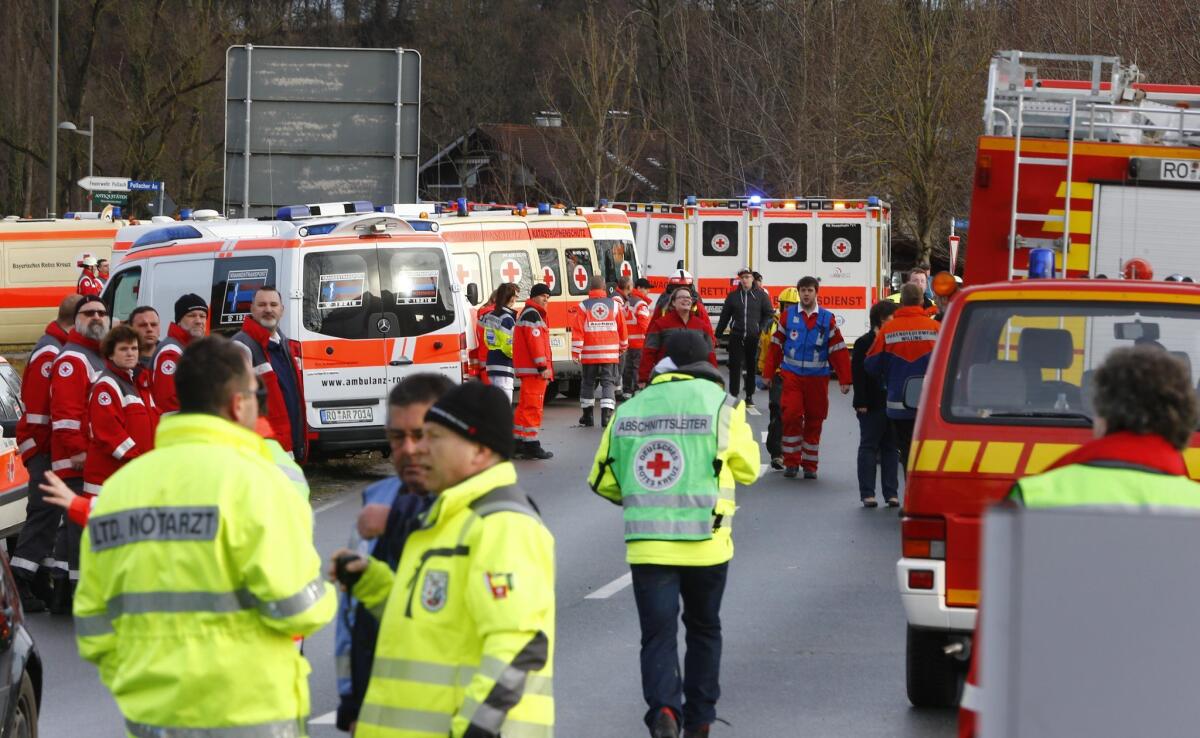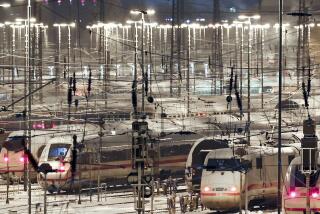At least 9 dead, dozens injured after trains crash in southern Germany

Rescue personnel wait in Bad Aibling, Germany, after a fatal train crash Feb. 9.
reporting from berlin — Two commuter trains crashed head-on Tuesday morning in southern Germany, killing at least nine people and injuring around 150, slamming into each other on a curve without braking after an automatic safety system apparently failed to stop them, the transport minister said.
The first rescue units were on the scene within three minutes of receiving emergency calls, but with a river on one side and a forest on the other, it took hours to reach some of the injured in the wreckage. Rescue crews using helicopters and small boats shuttled injured passengers to the other side of the Mangfall River to waiting ambulances.
Authorities said they were taken to hospitals across southern Bavaria.
“This is the biggest accident we have had in years in this region and we have many emergency doctors, ambulances and helicopters on the scene,” police spokesman Stefan Sonntag said.
German rail operator Deutsche Bahn said safety systems on the stretch had been checked as recently as last week, but Transport Minister Alexander Dobrindt suggested a system designed to automatically brake trains if they’ve accidentally ended up on the same track didn’t seem to have functioned properly.
Dobrindt, however, said it was too early to draw conclusions.
“The site is on a curve, we have to assume that the train drivers had no visual contact and hit each other without braking,” Dobrindt told reporters in Bad Aibling, near the crash scene, adding that speeds of up to 100 kph (60 mph) were possible on the stretch.
Black boxes from both trains had been recovered and are now being analyzed, which should show what went wrong, Dobrindt said.
“We need to determine immediately whether it was a technical problem or a human mistake,” he said.
The two regional trains crashed before 7 a.m. local time on the single line that runs near Bad Aibling, in Bavaria, and several cars overturned. The two train drivers are thought to be among the dead, and 50 of those hurt were being treated for serious injuries, authorities said.
Each train could hold up to 1,000 passengers and are commonly used by children traveling to school, but because of regional holidays to celebrate Carnival, fewer than 200 were on board in total.
“We’re lucky that we’re on the Carnival holidays, because usually many more people are on these trains,” regional police chief Robert Kopp said.
About 700 emergency personnel from Germany and neighboring Austria were involved in the rescue efforts and about a dozen helicopters were used.
Train operator Bayerische Oberlandbahn said it had started a hot line for family and friends to check on passengers.
“This is a huge shock. We are doing everything to help the passengers, relatives and employees,” Bernd Rosenbusch, the head of the Bayerische Oberlandbahn, said in a statement.
In Munich, the city blood center put out an urgent call for donors in the wake of the crash.
The Munich Blood Donation Service, which delivers blood products to local hospitals, said on its website that there was “an acute increased need for life-saving blood products” after the accident and called for immediate donations.
Germany is known for the quality of its train service, but the country has seen several other accidents, typically at road crossings.
Most recently, a train driver and one passenger were killed when a train hit the trailer of a tractor in western Germany in May, injuring another 20.
In 2011, 10 people were killed and 23 injured in a head-on collision of a passenger train and a cargo train on a single-line track close to Saxony-Anhalt’s state capital Magdeburg in eastern Germany.
Germany’s worst train accident happened in 1998, when a high-speed ICE train crashed in the northern German town of Eschede, killing 101 people and injuring more than 80.
NEWSLETTER: Get the day’s top headlines from Times Editor Davan Maharaj >>
ALSO:
Former murder capital of Mexico presents sunnier image for pope
Punish or engage? No easy answer to North Korea’s nuclear ambitions
Fighting mosquitoes with mosquitoes: Biological weapons target Zika virus
More to Read
Sign up for Essential California
The most important California stories and recommendations in your inbox every morning.
You may occasionally receive promotional content from the Los Angeles Times.










